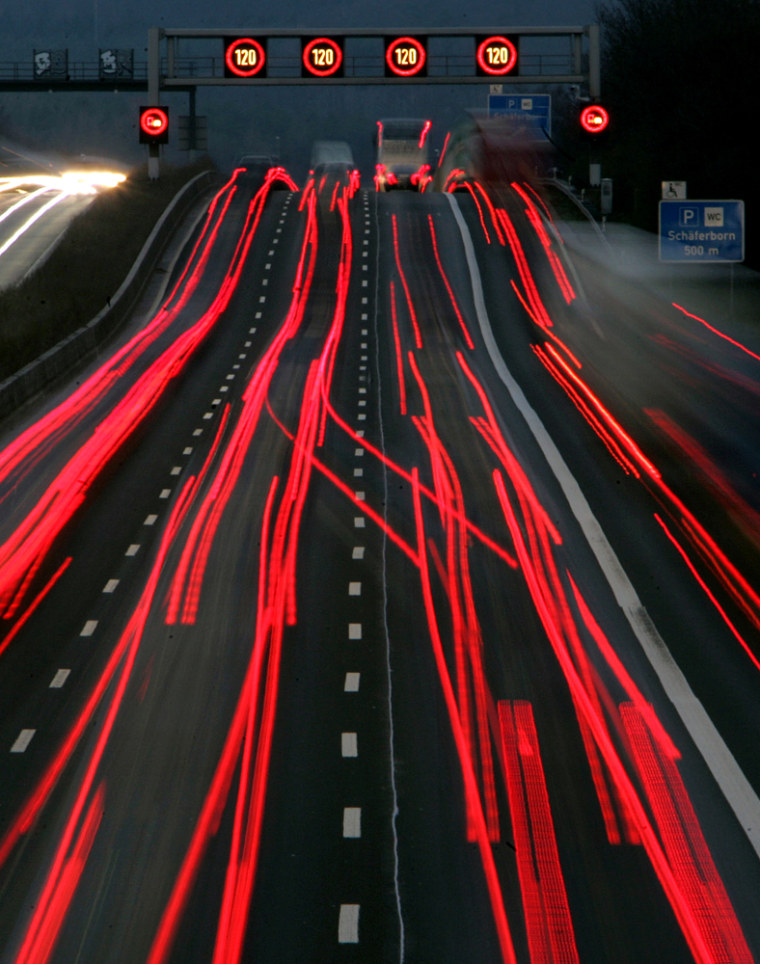A European Union official's suggestion that Germany impose speed limits on the autobahn to fight global warming has drawn angry responses in a country that cherishes what it calls "free driving for free citizens."
The call came as the German government makes action against climate change a priority of its current presidencies of the EU and Group of Eight industrialized nations.
Still, the German environment minister showed little enthusiasm for EU Environment Commissioner Stavros Dimas' suggestion. And a group representing the country's auto industry said it needed "no coaching on efficient climate protection from Brussels."
"The German auto industry will act on climate change where there is real potential for savings" of vehicle emissions, the group said in a statement.
Many stretches of German autobahn lack speed limits — traditionally a cherished freedom in a rule-bound country. However, the growing concern over carbon dioxide emissions is putting that tradition under renewed scrutiny.
"There are so many areas in which we waste energy in a completely senseless way and burden the climate," Dimas told the Bild am Sonntag newspaper.
Normal but controversial
"A simple measure in Germany could be a general speed limit on highways," he added, according to the newspaper. "Speed limits make a lot of sense for many reasons and are completely normal in most EU states, as in the U.S.A. — only in Germany, strangely, is it controversial."
The commissioner did not suggest a specific speed limit for Germany but in most European countries the highway speed limit is either 75 and 80 miles per hour. Britain, Latvia and Sweden have the strictest speed limit with 70 mph, according to an official EU Web site.
Dimas' comments drew a slew of largely negative responses on the daily Sueddeutsche Zeitung's Internet site. One respondent described the debate as a "farce" and questioned the environmental record of Dimas' native Greece.
Another demanded "free driving for free citizens" — quoting one of Germany's most popular and well-known slogans.
Chancellor Angela Merkel, who has said Europe should take a leading role in combating climate change to set an example to the U.S., China and others, last week steered an EU summit to a bold set of measures to fight global warming.
Among several initiatives, the EU is planning to push for an increased use of energy-saving light bulbs to slash energy consumption and reduce the effects of greenhouse gases.
In Britain, the opposition Conservative Party said Sunday it is considering new taxes on air travel. In the Bild interview, Dimas also said that the EU Commission wants to raise the rates for European and trans-Atlantic flights.
'Trivialization' of issue?
However, Merkel has brushed aside previous suggestions — most recently last month — that a general speed limit on the autobahn would help fight climate change.
Environment Minister Sigmar Gabriel said Sunday that he has "nothing against (a limit) for reasons of traffic safety" but argued that the restriction would not encourage manufacturers to produce more environment-friendly engines.
"This is a secondary front and a trivialization of the climate problem," he said at an event in Hamburg.
A spokesman for Germany's Transport Ministry, Dirk Inger, said a study by a federal agency had found that an overall autobahn limit of 100 kilometers per hour — or 62 mph — would reduce carbon dioxide emissions by only 0.6 percent.
Each 5 mph a car drives over 60 mph reduces fuel economy by 10 percent, according to the U.S. Department of Energy.
Inger also contended that, among European countries, only Germany had succeeded in reducing vehicle emissions.
"Symbolic politics doesn't help us move forward on climate protection," Inger said. "That goes for Mr. Dimas too."
Germans may be becoming receptive to the idea, however. Last month, a survey by the Forsa institute for Stern magazine found that 60 percent would favor autobahn speed limits to cut emissions, while 38 percent would oppose them.
The Feb. 1-2 survey of 1,001 people gave a margin of error of plus or minus 3 percentage points.
"I like to drive fast on the autobahn — sometimes I drive up to 200 (125 mph) — but if it is for the sake of the environment, I don't mind slowing down," said Thorsten Einig, 36, an information technology product manager in Karlsruhe who owns a BMW.
"I think anyone with half a brain understands that we all have to change our habits in order to limit the greenhouse gases."
